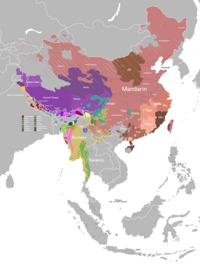Xiqi language
Appearance
| Xiqi | |
|---|---|
| Native to | China |
| Ethnicity | Yi |
Sino-Tibetan
| |
| Language codes | |
| ISO 639-3 | – |
Xiqi (Chinese: 西期; autonym: ɕi33 tɕhi33 pho21)[1] is an unclassified Loloish language of Huaning County, Yunnan, China. It is also called Siqipo 斯期颇 (sɿ55 tɕhi55 pho21) in Mile County.[2]
Classification
[edit]Pelkey (2011:431)[3] suggests that the Xiqi, Ati, and Long languages of Huaning County may be Southeastern Loloish languages. Hsiu (2018) suggests a Northern Loloish affiliation.[4]
Distribution
[edit]The Huaning County Gazetteer 华宁县志 (1994:514) lists the following locations of Xiqi.
- Tonghongdian Township 通红甸乡: Suomeizao 所梅早村,[5] Dapozuo 大婆左村[6]
- Panxi Township 盘溪乡: Yide 矣得村,[7] Fagao 法高村,[8] Dayaxi 大丫喜村, Longtanying 龙潭营村[9]
- Chengjiao Township 城郊乡: Dengloushan 登楼山,[10] Puchazhai 普茶寨[11]
- Huaxi Township 华溪乡: Xishajing 西沙井村, Dujia 独家村[12]
- Qinglong Township 青龙镇: Shanqi 山歧村,[13] Qize 起则村
Vocabulary
[edit]The Huaning County Ethnic Gazetteer (1992:72)[14] provides a short word list of Adu, Ati, Xiqi, Nong, and Azhe transcribed using Chinese characters, shown below. Pinyin transliterations have also been provided below.
| English gloss | Chinese gloss | Adu (阿笃语) | Ati (阿梯语) | Xiqi (西期语) | Nong (弄语) | Azhe (阿哲语) |
|---|---|---|---|---|---|---|
| village | 寨子 | 且 | 且 | 卡 | 卡 | 卡 |
| water | 水 | 叶 | 叶 | 矣咋 | 翁咋 | 叶 |
| girl | 小姑娘 | 燃米诺 | 尼格莫 | 阿门儿若 | 阿门儿少若 | 若麻儿西若 |
| boy | 小伙子 | 茶塞 | 差血若 | 阿杂若 | 撮沙若 | 若那儿 |
| corn | 包谷 | 矣白儿 | 苏柏儿 | 阻目 | 苏木白儿 | 火魔 |
| have | 有 | 杂杂 | 杂杂 | 白儿 | 杂 | 祖阿(杂) |
| not | 无 | 麻 | 麻 | 麻 | 麻 | 阿米 |
References
[edit]- ^ Yunnan Province Ethnic Minority Languages Gazetteer (云南省志:少数民族语言文字志), p.30
- ^ Long Luogui 龙倮贵. 2007. Honghe yizu zuyuan zucheng ji qi renkou fenbu 红河彝族族源族称及其人口分布 Archived 2017-12-22 at the Wayback Machine.
- ^ Pelkey, Jamin. 2011. Dialectology As Dialectic: Interpreting Phula Variation. Berlin: De Gruyter Mouton.
- ^ Hsiu, Andrew (2018). "Nisoish". Sino-Tibetan Branches Project. Retrieved 2023-03-09.
- ^ "华宁县通红甸乡所梅早村民委员会". ynszxc.net. Archived from the original on 2018-12-30. Retrieved 2017-12-30.
- ^ "华宁县通红甸乡大婆左村民委员会". ynszxc.net. Archived from the original on 2018-12-30. Retrieved 2017-12-30.
- ^ "华宁县盘溪镇矣得村民委员会". ynszxc.net. Archived from the original on 2018-12-30. Retrieved 2017-12-30.
- ^ "华宁县盘溪镇法高村民委员会". ynszxc.net. Archived from the original on 2018-12-30. Retrieved 2017-12-30.
- ^ "华宁县盘溪镇龙潭营村民委员会". ynszxc.net. Archived from the original on 2018-12-30. Retrieved 2017-12-30.
- ^ "华宁县宁州镇普茶寨村民委员会登楼山村". ynszxc.net. Archived from the original on 2018-12-30. Retrieved 2017-12-30.
- ^ "华宁县宁州镇普茶寨村民委员会". ynszxc.net. Archived from the original on 2018-12-30. Retrieved 2017-12-30.
- ^ "华宁县华溪镇独家村村民委员会". ynszxc.net. Archived from the original on 2018-12-30. Retrieved 2017-12-30.
- ^ "华宁县青龙镇山岐村民委员会". ynszxc.net. Archived from the original on 2018-12-30. Retrieved 2017-12-30.
- ^ Huaning County Ethnic Gazetteer Editorial Committee (ed). 1992. Huaning County Ethnic Gazetteer 华宁县民族志. Kunming: Yunnan People’s Press 云南民族出版社.

